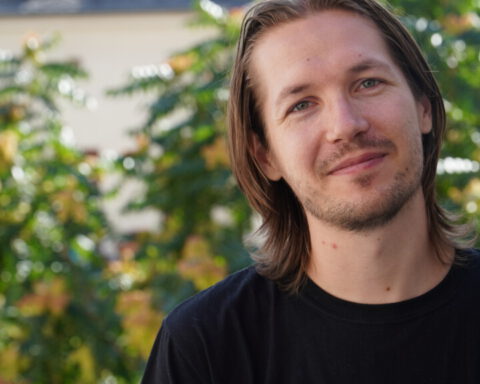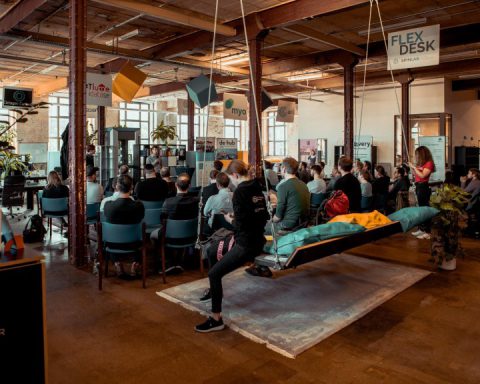Welcome to Leipzig, Germany, home of culture, music, students, and… Artificial Intelligence?
It isn’t surprising that Leipzig hasn’t been known to be on the frontier of AI development. This could partly be due to the laid-back, somewhat technophobic data conservatism that plagues the rate of tech adoption in Germany.
We all know that Datenschutz is the buzzword here, especially when the GDPR (General Data Protection Regulation) actively entrenches EU entrepreneurs and creative freelancers alike in potentially hindering bureaucracy. Once we take a look at the rapid adoption of technology seen in China, it doesn’t come as a surprise that their culture doesn’t particularly place an emphasis on data protection.
Even ranking fourth among the world’s Artificial Intelligence hubs, Berlin is still way behind Silicon Valley in AI development metrics – along with London and Paris.

Leipzig, as always, is hiding in big-brother-Berlin’s shadow. Aside from the obvious difference in population and infrastructure between the two cities, I was shocked to learn that Leipzig is a mere “Gamma minus” city, well below Berlin’s “Beta” status, according to the Globalization and World Cities Research Network.
This means that, among global cities, Leipzig ranks at the bottom of the scale in the degree to which it is connected economically, politically and culturally with the rest of the world market (on par with Dresden and Nuremberg). We’re but a minor regional power to them, but hey – at least we’re recognized as a global city at all!

We can do better than that, and I think it’s possible to suggest that what makes the startup / tech scene thrive in Berlin has been slowly seeping its way into the Leipziger ecosystem. What happens in Berlin, doesn’t stay in Berlin!
Though it may take some time before Leipzig is a player in the big leagues, Artificial Intelligence will undoubtedly become increasingly relevant in the generation of new startups as they attempt to compete in the already cut-throat landscape.
Things have been stirring in Leipzig’s startup soup over the past year, AI-wise.
Back in late February, I attended the first edition of #LEAI (Leipzig AI Meetup) at Basislager.
This initiative was organised by the tantalisingly energetic duo Ceyhun Derinbogaz and Robert Beier.
Ceyhun is an entrepreneur and founder with the alibi of working on blockchain and cryptocurrency projects by day, whilst building mechanical robots with his bare hands by night. Robert is a full-stack developer, with a passion for machine learning. They explained a bit about what made them take the initiative to organise this event:
“We started the Leipzig AI Meetup because we think Leipzig has great potential to be one of the biggest tech hubs in Europe. When I [Ceyhun] moved to the city in 2015, there were little to no English-speaking tech events, but I [have since] met a lot of expats in Leipzig with lots of potential. Basically they (and I) needed a ‘home’ to discuss, learn and share on Artificial Intelligence topics in an international environment. In a short time, we grew to 300 members and the number is still growing. [For] upcoming meetups, we are planning hackathons and announcing project partnerships with companies and research institutes. We believe that with a small but growing crowd, the Leipzig AI Meetup will draw [more] attention from the international community.”
At the kick-off meetup, three speakers (including myself!) held presentations on Artificial Intelligence, with differing themes.

Robert did a fantastic job giving the audience a basic understanding of Artificial Intelligence, using some facial recognition examples. I did what any Elon Musk enthusiast would do, and gave a talk about Neuralink, OpenAI, and how bloody crazy (or ingeniously brilliant) the idea of hooking up your brain to a computer interface is, and what this means for future applications of AI.
Finally, a talk given by Dr. Christian Meisel on the “cutting-edge usage of Deep Learning for predicting epileptic seizures” showed real-world applications and benefits for the development of Artificial Intelligence in the medical sphere.
In some sense, I was the antichrist to Christian’s ground-breaking talk.
Whereas I threw mountains of meta-level super-intelligent AI scepticism atop the already steaming pile of pop-culture AI crap, Christian shed some light on the discussion, showing that there are blaringly obvious benefits to the continued development of AI – namely, saving people’s lives. Either way, the evening was productive for everyone who attended.

Fast-forward to the third #LEAI meetup at the start of summer, and we end up at SpinLab, Leipzig’s largest startup accelerator.
Free pizza and beer get the room buzzing, and I get to chat with the two speakers before the event begins: Alberto Valdunciel from DOCYET, and Artur Lohrer from Sensape. Both these startups graduated from SpinLab and keep their offices in the alumni aisle.

I found DOCYET particularly interesting. Alberto explained that they are developing a multi-lingual AI chatbot, capable of referring you to the nearest doctor wherever you are in the world. It’s based on performing symptom checks to infer the best method of treatment. How does it do this? It talks to you – just like a normal doctor would.
Amid an energised (albeit rather sceptical) discussion about the hypothetical scenario of whether or not an AI could more accurately diagnose a patient versus a human general practitioner, Alberto was certain that AI would come out on top. Purely based on the sheer amount of data the medical industry has available to it.
It became apparent that Alberto’s vision leans towards connecting patients to the medical services they need – and DOCYET was going to provide the interface for this. Getting there isn’t going to be easy, however.
Sensape is on the other side of the AI spectrum. They provide commercial “interactive infotainment” in the form of a monitor equipped with facial recognition, which displays advertisements customised to react specifically to your age, gender, what you are wearing, and your emotions. If this doesn’t make you throw your Birkenstocks in the air and run down the street screaming “Datenschutz!!”, I don’t know what will.
First to the stage was Alberto, who began the talk with an issue relating to AI and semantics (the study of the meaning of words). Apparently, getting an AI to understand semantics is extremely difficult. Hell, even us humans don’t do it properly most of the time.
Alberto made a hilarious example whilst explaining the importance of semantics.
Try to read this headline:
“Republicans Grill IRS Chief Over Lost E-mails”
This type of sentence has great possibilities because of its two different interpretations:
1. Republicans harshly question the chief about the e-mails.
2. Republicans cook the chief using e-mail as the fuel.
I must admit I nearly snorted in the library whilst re-reading this. But with jokes aside, the ambiguity of the semantics of sentence structure is a big issue when dealing with chatbot development. Alberto & Co deal with these kinds of misunderstandings on the daily.
Considering that they are developing an AI for the health industry, lives are at hand – so all communication must be inferred as accurately as possible by the AI.
DOCYET goes about teaching AI how to overcome problems like these with a combination of “Natural Language Processing” (NLP) and statistical models. NLP is an area of computer science tasked with conveying meaning between human languages and computers.
Whenever you use a computer to translate, or check your grammar using word processing software (like Microsoft Word or Google Docs), your computer is using NLP to understand the meaning behind the words that you type, in order to provide those sometimes creepily-accurate (or sometimes downright-wrong) autocorrect suggestions that we all know and love.
Alberto explained that conceptually, an artificial neural network is a group of nodes with different weightings – similar to the way neurons in our brain are structured. These nodes undertake “deep learning” by treating words like mathematical operations. Imagine words as a matrix of vectors, where vectors document the analogies between words:

This is the first time I’ve seen contextualisation of words being used mathematically, and for an ex-IPSP Physics student like myself (turned Digital Humanities student), it was pretty awe-inspiring.
Alberto went further into depth explaining how a computer goes about doing this, using algorithms, lemmatisation and stemming. These are topics deserving of their own posts, but are essentially how an AI reduces words into their meaning and figures out how to operate on them.
Everyone walked out of the room with an insight for what was previously labelled “mysterious AI magic.”
Second to the stage, Artur Lohrer from Sensape presented a “Convolutional Neural Network” demo. Artur did a great job walking us through how the algorithm works and how Sensape can, for instance, recognise pictures of a backpack.
If you think of a picture as a matrix – where 0 is black, and 255 is white – the numbers represent the intensity of the pixels on your display, which specifies colour through different channels, in turn representing the intensity of the individual red, green, and blue LED’s.
Following an intuitive explanation of how an AI detects edges between objects in pictures, the talk and the evening came to a close.
Already #LEAI has provided a platform for a vibrant, tech-enthusiastic community with a lot to share.
With simply explained concepts, witty jokes and a melting pot of friendly faces from all corners of the earth, everyone can learn more about what technology means for us, and how our lives might change in the near future – while having fun.
Indeed, Leipzig is excited about AI and definitely has the capacity to make something of it. What remains for students, and tech enthusiasts in general, is to get out there and contribute.
I hope this technical themed post tickled your tech-buds. (I’m so not sorry.) If you enjoyed this format, make sure you give us some feedback under #TechTavern!







